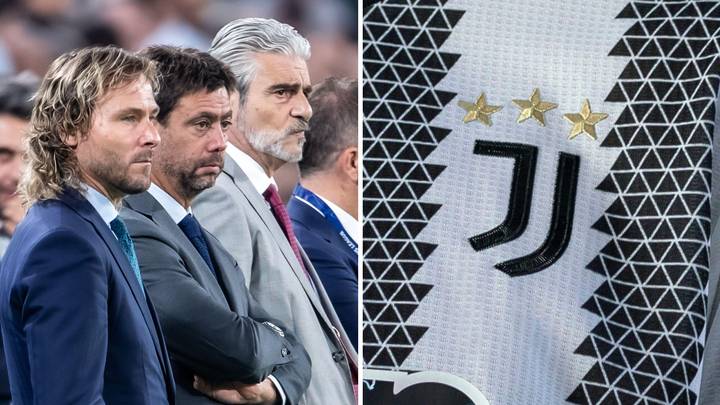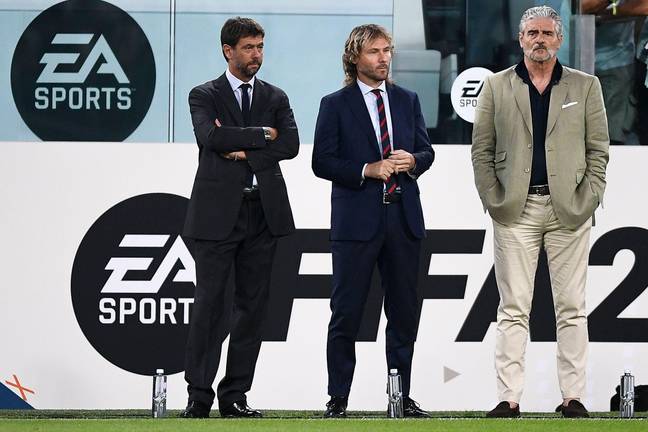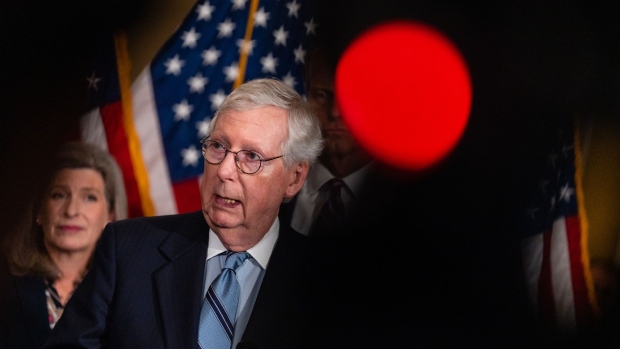Lebanese hold up banks to claim their own money in financial crisis
Depositors have been taking justice into their own hands to access their savings frozen since the financial collapse in 2019.
By ANDREA LÓPEZ-TOMÀS/THE MEDIA LINE
Published: NOVEMBER 28, 2022
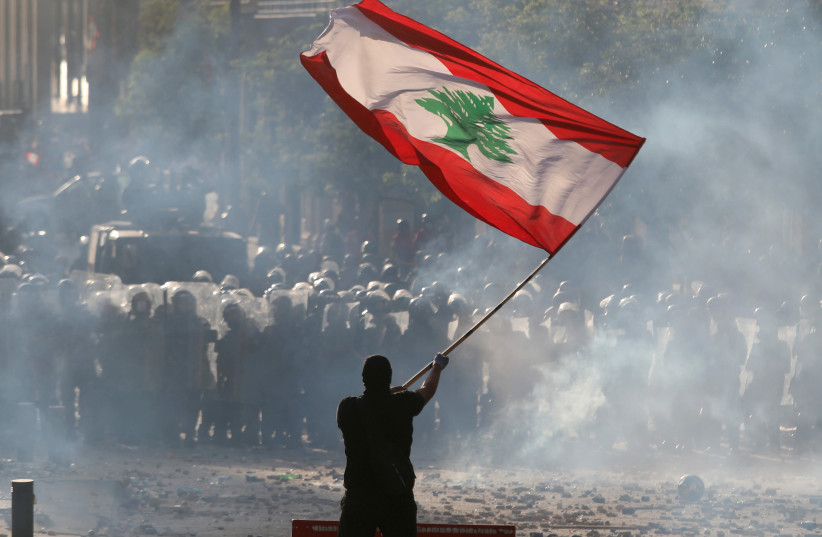
A demonstrator waves the Lebanese flag in front of riot police during a protest in Beirut, Lebanon, August 8, 2020
(photo credit: GORAN TOMASEVIC/REUTERS)
Dr. Anis Tannous placed an olive tree in front of a branch of his bank. In the Koura area, in northern Lebanon, this family man came unarmed and organized a sit-in in front of Société Générale de Banque du Liban, a Lebanese bank and a subsidiary of SGBL Group. Despite his health problems, he stayed there all morning demanding the transfer of his son’s student loan to the United States. The olive tree prevented anyone from entering or exiting the establishment.
For more stories from The Media Line go to themedialine.org
In the south of the country, Reda Reda, a former Lebanese Army soldier, held up a bank in Tyre to ask for his own money. He didn’t carry a gun with him but he said he just wanted to get his savings in order to take care of his mother who has cancer.
Back to the north, in Tripoli, a depositor broke into a branch of the Intercontinental Bank of Lebanon with her sick mother. After negotiations with the administration, Amina Mohammad got $15,000 of her own savings.
All of these bank holdups happened in just one day, November 23, in the small country of Lebanon. The perpetrators were all depositors of the banks they assaulted. But, despite having money in their accounts, Lebanese can’t access it. Their banks only allow them to take $200 out per month, so they have turned to the use of symbolic force.
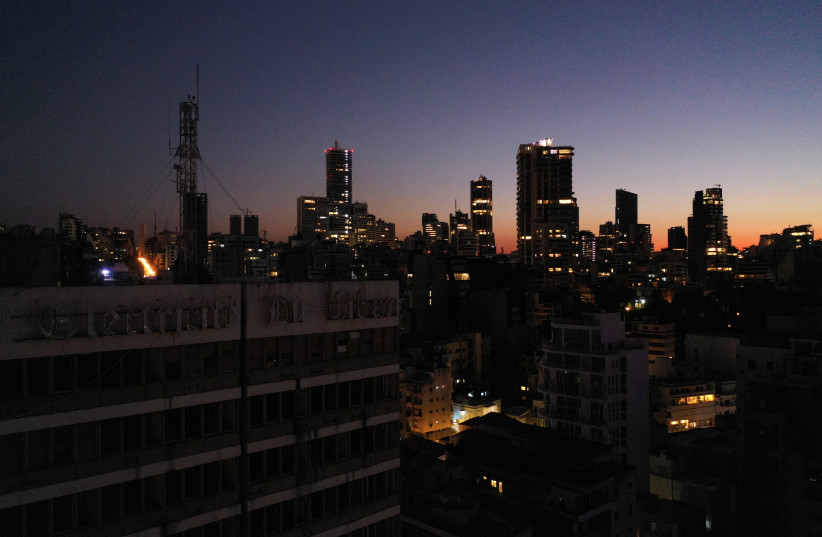
'It's their only option'
“The financial, economic, and social situation in Lebanon is bad – really bad,” said Fouad Debs, a lawyer for the Depositors Union. “We have seen a contraction of the economy to a quarter of what it was, a huge rise in poverty and unemployment, a destruction of all safety nets, the collapse of State services, so people have no more income and hence, they’re resorting to their savings that the banks have stolen,” he told The Media Line. “It’s their only option,” he added.
Since summer, these bank heists have become a reality for the Mediterranean country. Lebanese have been dealing with a financial and economic crisis, one of the world’s worst since the 1850s, according to the World Bank. When it started in 2019, banks imposed capital controls overnight that have never been made legal via legislation. These informal mechanisms have allowed financial institutions to impose limitations on bank withdrawals.
Without access to their own savings, Lebanese try to live by the day, but the current situation makes it very difficult. The lira has lost around 90% of its value against the dollar, and three-quarters of the population has plunged into poverty, according to the United Nations. “People have waited almost three years and have endured a lot,” said Debs.
“Some had hoped to see their money. Others had some other source of income to sustain themselves and their families,” the Depositors Union’s lawyer explained. “Unfortunately, today, three years following the collapse, people are getting sicker and poorer, and they are devastated and hopeless,” he added.
Regular mismanagement and corruption among the country’s powerful elite have left many to fear that their life savings are gone. Rami Ollaik, also a lawyer, created the group United for Lebanon against Corruption. Ollaik’s face has become well-known nationally since he often accompanies depositors during their bank holdups.
“We are living with zero dignity as victims of these monsters from the mafia,” said Ollaik, referring to the political class. “Our lives are being compromised because of their greed and crimes,” he told The Media Line. That is why they moved their fight from the legal system to direct action. They are planning new acts “targeting bank owners and judges, who are accomplices in crime, at their residences.”
Sense of desperation creeping over Lebanese society
The reasons for the rise in this phenomenon have a lot to do with a sense of desperation creeping over Lebanese society. “Most of the depositors who have held up banks were doing it for health and educational reasons, followed by payment of debts,” Debs told The Media Line.
For now, there haven’t been many legal consequences for those who chose to hold up their banks. The Depositors Union has “portrayed this strategy as a misdemeanor or taking justice into their own hands, and the judges are convinced by such an approach,” Debs explained.
Ollaik uses the same justification. “We see the liberation of deposits as falling under the right of self-defense. When all other ways evidently fail, according to Article 184 of the Lebanese Penal Code, taking justice into one’s hands becomes legitimate, even if the acts would be considered crimes under normal conditions,” he said.
Most of the depositors have succeeded in getting part of their savings out, in most cases to be used for medical treatments.
Since the heist strategy’s surge, many banks have closed or limited their in-person customer support services to try to stop the spread of this phenomenon. The bank employees’ union said that around 6,000 employees have lost their jobs since the crisis began. For now, this approach has not been successful. Many bank employers say the robberies are misguided anger that should be directed at the Lebanese state.
But depositors argue that bank owners are among the first to be blamed for the collapse. “When a depositor is dying at the gates of the hospital while the bank keeps their money and the bankers spend it on private planes, that is not right,” Ollaik told The Media Line. “We consider it legitimate that they claim their savings by force,” he added.
And Lebanese society thinks the same way. “Unsurprisingly, society and the people have supported these kinds of actions,” said Debs. People see these depositors as modern Robin Hoods taking matters into their own hands and doing what is right. That is also why some new groups such as the Depositors Union have been created. These associations aim to give support and legal assistance to those affected by the financial crisis.
For years now, Lebanese authorities have been engaged in conversations with the International Monetary Fund (IMF) to get a bailout plan for the country’s economy. But the global institution has laid down some basic requirements that Lebanon has not fulfilled. Among other demands, a formal capital control law is needed.
The IMF has asked for other significant reforms, including restructuring the banking sector and lifting bank secrecy laws. “The only long-term, sustainable solution is through a recovery plan that is fair, comprehensive, transparent, and includes the restructuring of the banks and the public debt, the safeguard of public assets and social protection, as well as holding the people responsible for the crisis and its mismanagement – mainly bankers, politicians, high-ranking civil servants, oligarchs, and oligopoly holders,” concluded Debs.
Meanwhile, the population will continue to take justice into their own hands. “The reason behind most holdups is desperation, but people are increasingly talking about taking back their money to feel empowered and defy the system,” said the lawyer for the Depositors Union.

